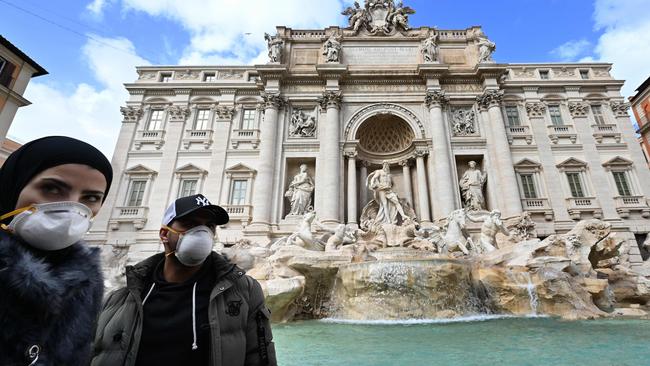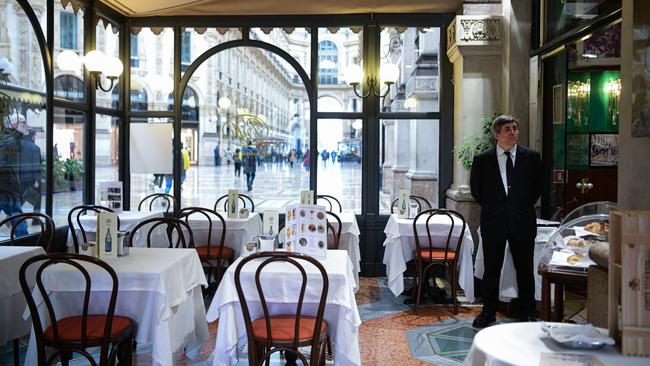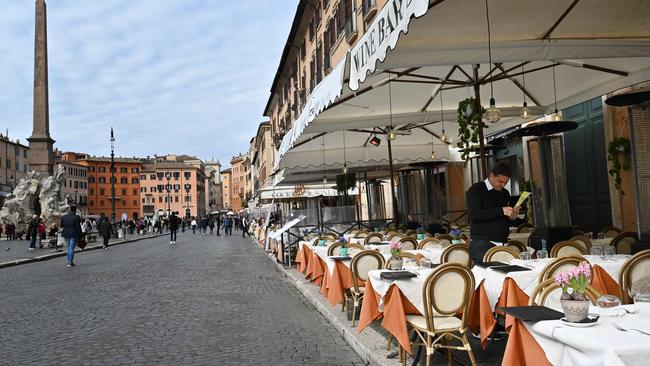Coronavirus fallout: Italy at risk of recession as tourism shrinks
The dearth of visitors in Italy’s financial capital offers a glimpse into how the coronavirus is hitting demand for goods and services.

In Milan’s historic Savini restaurant, between the city’s cathedral and La Scala opera house, just three of 20 tables had customers on a recent evening, and the normally bustling pedestrian streets nearby were sparsely trod.
The dearth of visitors in Italy’s financial capital offers a glimpse into how the new coronavirus is hitting demand for goods and services. It could be a harbinger of recessions in Italy and in the broader EU as the epidemic expands.
Italian companies face cancelled orders from foreign customers and disrupted international supply chains as Chinese production grinds to a halt. But the fall in consumer spending poses possibly the biggest risk for the EU’s third-biggest economy — if Italian households keep curbing buying and foreign tourists stop coming for a sustained period.
“The drop in demand is very worrying,” said Francesco Daveri, an economist at Milan’s Bocconi University. “The likelihood that Italy falls into recession depends more on demand than on supply-chain problems.”
New car sales in Italy, a leading economic indicator, fell 8.8 per cent in February. About 60 per cent of car dealers now expect sales to fall in the next three to four months, according to Centro Studi Promotor, a research firm.
Italy’s government this week said it would spend €7.5bn ($12.8bn) to support the ailing economy and health sector. Officials are talking with unions and business lobbies to decide how the stimulus will be spent.
The possibilities include the extension of unemployment benefits, temporary tax breaks, funds for struggling hospitals and spending directed at areas most hit by the virus.
Italy’s coronavirus outbreak has become the world’s biggest outside Asia. Almost 90 per cent of virus cases have been in the regions of Lombardy, Veneto and Emilia Romagna, which together account for 40 per cent of the country’s economic output.
The government hopes its measures, including clampdowns on public gatherings, school suspensions, and the quarantining of some towns in northern Italy, will start to slow the rate of new infections by this weekend.
Milan, Lombardy’s normally vibrant capital and Italy’s top international business centre, must bounce back quickly if Italy is to pull out of its downturn. The city and its surrounding region are already feeling the pain, from industry and agriculture to tourism and retail.

After a spate of panic buying at the early stages of Italy’s coronavirus outbreak, William Tatel has seen volume at his fish stand in one of Milan’s busiest markets sink about 40 per cent. He is cautiously optimistic that things will improve soon. “People seem to be calming down, so I think once they get through what’s in their freezers they will come out and start spending again,” he said.
Tourism, which accounts for about 10 per cent of the country’s economy, began declining as Chinese visitors deserted the country and then as droves from other countries began cancelling reservations all the way up to the northern summer, according to industry lobbies.
Last week, Italian bars and restaurants in the three regions most hit by the virus lost 70-90 per cent of their normal revenue due to the lack of tourists and Italians limiting spending mostly to essential goods, according to industry lobby Fipe. The sector could suffer a 20 per cent drop in sales in the three months to the end of April across the nation, meaning about €4bn in lost revenue, said Luciano Sbraga, Fipe’s deputy director.
“Chinese restaurants and bars were the first to be hit,” Mr Sbraga said. “Then there was a drop in the number of tourists, and now a large decrease in Italians consuming, which is our biggest concern.”

A prolonged downturn could further strain Italian companies, especially those in tourism, fashion and luxury, and manufacturing, according to a recent study by Cerved Rating Agency. If the global virus emergency lasts until the end of this year, 10 per cent of Italian non-financial companies could be at risk of default, it said.
Even in Rome, which has only a few confirmed virus infections, locals and foreign visitors are retreating. Lorenzo Bernardi, a taxi driver, now waits about half an hour between fares rather than the usual five to 10 minutes.
“I have never seen so few tourists in Rome,” he said.



To join the conversation, please log in. Don't have an account? Register
Join the conversation, you are commenting as Logout